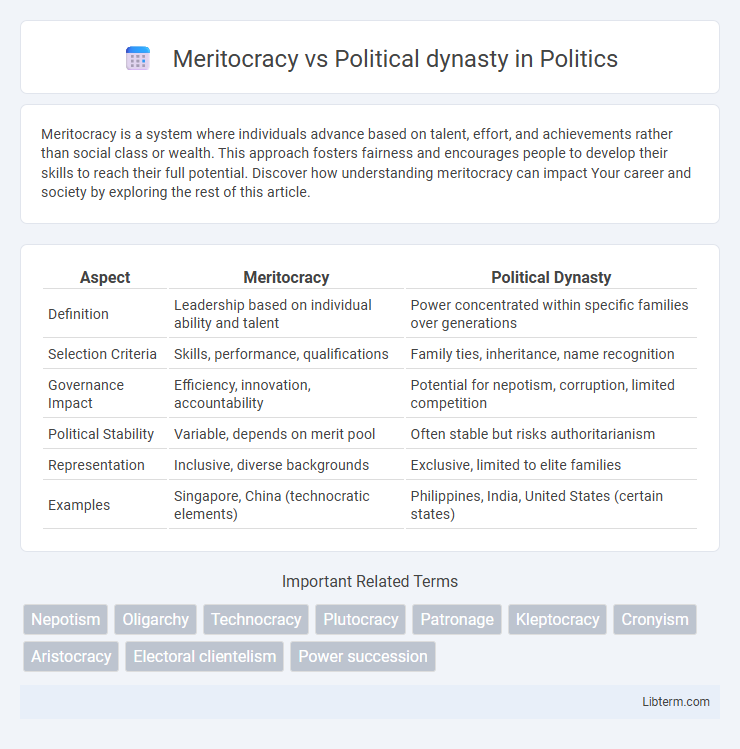Meritocracy is a system where individuals advance based on talent, effort, and achievements rather than social class or wealth. This approach fosters fairness and encourages people to develop their skills to reach their full potential. Discover how understanding meritocracy can impact Your career and society by exploring the rest of this article.
Table of Comparison
| Aspect | Meritocracy | Political Dynasty |
|---|---|---|
| Definition | Leadership based on individual ability and talent | Power concentrated within specific families over generations |
| Selection Criteria | Skills, performance, qualifications | Family ties, inheritance, name recognition |
| Governance Impact | Efficiency, innovation, accountability | Potential for nepotism, corruption, limited competition |
| Political Stability | Variable, depends on merit pool | Often stable but risks authoritarianism |
| Representation | Inclusive, diverse backgrounds | Exclusive, limited to elite families |
| Examples | Singapore, China (technocratic elements) | Philippines, India, United States (certain states) |
Defining Meritocracy and Political Dynasty
Meritocracy is a system of governance where individuals attain positions of power based on their talents, skills, and achievements, emphasizing competence and performance. Political dynasty refers to a succession of family members who hold political office over generations, often prioritizing lineage and inherited influence over merit. While meritocracy highlights equal opportunity and capability, political dynasties may perpetuate power concentration within specific families, impacting democratic representation.
Historical Contexts of Governance
Meritocracy emerged prominently during the Enlightenment as a governance model emphasizing skill and competence, contrasting sharply with political dynasties that dominated many historical regimes through hereditary power. In ancient China and imperial bureaucracies, merit-based civil service exams were introduced to limit aristocratic rule, yet political dynasties retained significant influence through familial ties. Modern governance debates often contrast meritocratic ideals with persistent political dynasties in regions like South Asia and Latin America, where historical colonial and feudal structures have reinforced hereditary political control.
Key Characteristics of Meritocracy
Meritocracy is characterized by the selection and advancement of individuals based on their skills, talents, and achievements rather than family ties or social status. It emphasizes equal opportunity, rewarding competence and hard work while promoting efficiency and innovation within organizations or governments. This system contrasts sharply with political dynasties, where power is often inherited and maintained through familial connections, limiting social mobility and merit-based progression.
The Formation and Impact of Political Dynasties
Political dynasties form through the concentration of power within specific families, often perpetuating inequality in political representation and limiting opportunities for merit-based leadership. The persistence of these dynasties undermines democratic processes by reducing competition and reinforcing patronage systems. Their impact includes entrenching socio-economic disparities and hindering policy innovation, as political positions are inherited rather than earned through qualifications and performance.
Social Mobility: Merit versus Lineage
Social mobility thrives in meritocratic systems where individuals advance based on talent, education, and achievements, fostering equal opportunities regardless of background. In contrast, political dynasties concentrate power within family lineages, limiting upward mobility and perpetuating entrenched social hierarchies. This dynamic restricts access to leadership roles for capable outsiders, undermining merit-based progress and reinforcing inequality.
Influence on Public Policy and Governance
Meritocracy promotes public policy grounded in expertise and qualifications, ensuring governance decisions are data-driven and aligned with societal needs. Political dynasties often prioritize familial or factional interests, which can lead to policies favoring elite groups rather than the broader population. This dynamic impacts governance quality, where merit-based systems tend to enhance accountability and efficiency, while dynastic politics may perpetuate nepotism and policy stagnation.
Economic Outcomes and Opportunity Distribution
Meritocracy promotes economic growth by allocating resources and positions based on talent and effort, fostering innovation and efficient productivity. In contrast, political dynasties often concentrate wealth and opportunities within a narrow elite, leading to economic inequality and restricted access to upward mobility. Studies show meritocratic systems correlate with broader opportunity distribution and higher GDP per capita, while dynastic politics tend to entrench poverty and limit social mobility.
Challenges and Criticisms of Each System
Meritocracy faces challenges such as perpetuating inequality by favoring individuals with access to better education and resources, which can limit social mobility and create elitism. Political dynasties attract criticism for undermining democratic principles by concentrating power within families, often leading to nepotism, corruption, and reduced political competition. Both systems struggle with issues of fairness and representation, where meritocracy risks exclusion of marginalized groups, and dynasties can entrench privilege at the expense of broader societal interests.
Global Case Studies and Comparisons
Meritocracy emphasizes leadership based on talent, qualifications, and achievements, as seen in Singapore's efficient civil service system, which contrasts with political dynasties like the Philippines, where family-based political control often limits democratic competition. South Korea's rapid modernization and innovation were driven by meritocratic principles, while India's regional states show mixed outcomes with persistent political dynasties affecting governance quality. Comparative analyses reveal meritocratic systems tend to foster economic growth and social mobility, whereas political dynasties may entrench inequality and inhibit institutional development.
Moving Toward Equitable Leadership Models
Meritocracy promotes leadership based on skills, qualifications, and achievements, fostering equitable opportunities for all individuals regardless of background. Political dynasties often concentrate power within specific families, limiting diversity and perpetuating inequality in governance. Transitioning toward equitable leadership models requires dismantling entrenched dynastic influences and reinforcing merit-based selection systems that prioritize competence and inclusive representation.
Meritocracy Infographic

 libterm.com
libterm.com